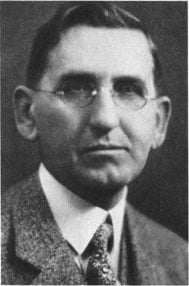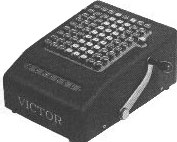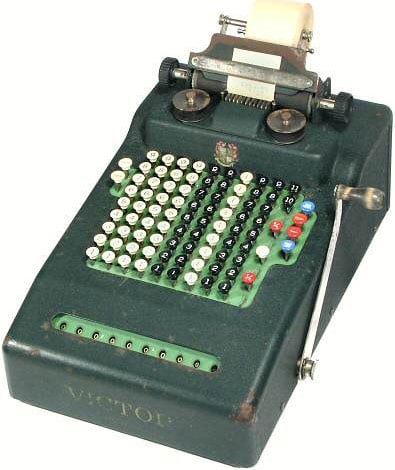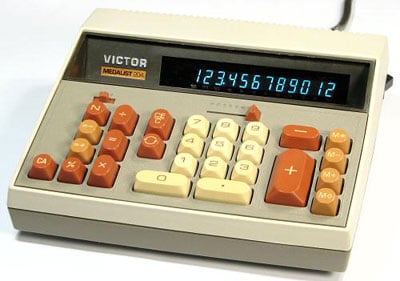
Victor Adding Machine Co. was established in Chicago in 1918, with the chief designer (and one of the 3 owners) Oliver David Johantgen (1875-1932), an engineer with a long (since 1896) experience in the field of mechanical calculators and a holder of several patents (see US patent №1306112 for Victor adding machine). They decided to name the company “Victor” even though it was among the most overused brand names in America. The struggling company faced almost certain collapse until they secured a deposit of $100 on a machine from one Carl Buehler, the owner of a successful chain of butcher’s shops and meat markets.
Buehler came into the adding machine business by a strange twist of fate. O.E. Cheesman, of the Victor Adding Machine Company, made a sales call to Buehler at one of his meat markets and convinced him to buy a Victor Adding Machine for $100. Instead of an actual machine, Buehler received a certificate in the mail, for 10 shares of stock in the company. He attended a stockholder meeting and was elected president of the company just months after he had accidentally bought stock in it.
Buehler soon discovered that the new company was sadly lacking in capital, production facilities, and business experience and that his promised adding machine was largely “vaporware”. However, Buehler recognized the potential of a low-cost machine, that could be sold to businesses such as his own, and agreed to get 10 shares of the company’s stock, to bankroll the company and assist in getting the project off the ground. He was quickly elected President of Victor, soon becoming the majority stockholder and installing his eldest son Albert C. Buehler as manager.

The first Victor adding machine, the Model 110 (see the nearby image), was introduced in 1919 but was not a very successful device. It was a full-keyboard non-printing machine with a front-mounted register, with only repeat and zeroing keys. So it would appear that this first model was a key-set design requiring a handle pull for each entry. In effect, it was a lister without the listing equipment. Apparently, very few of these machines were ever sold and Victor moved swiftly into production of a lister model (strangely enough, under the same name — Model 110). The company sold 100,000 of its improved Model 110 by 1926. The early non-printing model cost $85, the model without carriage cost $100, and the model with carriage $125. In 1921 the machine was extended at the rear to include a printing mechanism and was released as the 200 series. At a retail price of $100, 2000 units sold in the first year.
Between 1921 and 1925, Victor’s annual sales jumped from less than $300,000 to nearly $2 million.
An improved 300 series appeared in 1923, and a machine with direct subtraction in 1928. The 300 series grew to include 6, 8, or 10-column machines, versions for fractions, time, or feet and inches, and export models for Sterling currency. The 500 series (see the lower image) with an optional internal motor drive appeared in 1931.
The following year, in 1932, Both Carl Buehler and Oliver Johantgen died at ages 66 and 57, respectively. Buehler’s son, A.C. Buehler, took the reigns of the Victor enterprise. A.C. focused on the well-being of his employees — setting up an employee profit-sharing plan — one of the first types of its kind.
Johantgen was replaced by Thomas O. Mehan, who had previously invented the old “Brennan” adding machine. He rolled out the Victor 600 and 700 series shortly before World War II. These modern designs were lightweight, affordable, and a huge success.
After the war, Victor got into the automatic calculator business and merged with the former Felt and Tarrant MFG, the Comptometer Corporation to form the Victor-Comptometer Corporation in 1961. By 1968, the little company purchased by accident had grown into a Fortune 500 company, with more than a dozen plants around North America — including the original Chicago factory.

During the 1980s, the corporation known as Victor Technology, LLC, survived into the present day. Victor Tech is still in the calculator business as the exclusive provider of Sharp calculators in the U.S. and Latin America and the largest provider of Sharp calculators in the U.S.

The image featured at the top of this post is ©Unknown author / public domain.



